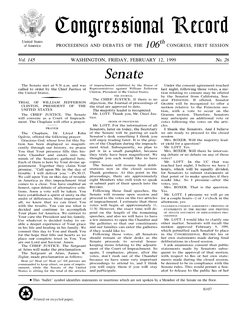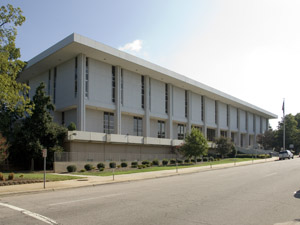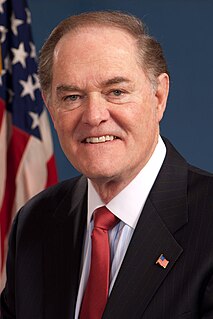Related Research Articles
The United States Government Publishing Office is an agency of the legislative branch of the United States federal government. The office produces and distributes information products and services for all three branches of the Federal Government, including U.S. passports for the Department of State as well as the official publications of the Supreme Court, the Congress, the Executive Office of the President, executive departments, and independent agencies.

The Congressional Research Service (CRS), known as Congress's think tank, is a public policy research institute of the United States Congress. As a legislative branch agency within the Library of Congress, CRS works primarily and directly for Members of Congress, their Committees and staff on a confidential, nonpartisan basis.
The United States budget process is the framework used by Congress and the President of the United States to formulate and create the United States federal budget. The process was established by the Budget and Accounting Act of 1921, the Congressional Budget and Impoundment Control Act of 1974, and additional budget legislation.

The Code of Federal Regulations (CFR) is the codification of the general and permanent regulations published in the Federal Register by the executive departments and agencies of the federal government of the United States. The CFR is divided into 50 titles that represent broad areas subject to federal regulation.

The Federal Register is the official journal of the federal government of the United States that contains government agency rules, proposed rules, and public notices. It is published every weekday, except on federal holidays. The final rules promulgated by a federal agency and published in the Federal Register are ultimately reorganized by topic or subject matter and codified in the Code of Federal Regulations (CFR), which is updated annually.

The Congressional Record is the official record of the proceedings and debates of the United States Congress, published by the United States Government Publishing Office and issued when Congress is in session. Indexes are issued approximately every two weeks. At the end of a session of Congress, the daily editions are compiled in bound volumes constituting the permanent edition. Chapter 9 of Title 44 of the United States Code authorizes publication of the Congressional Record.

The Federal Depository Library Program (FDLP) is a government program created to make U.S. federal government publications available to the public at no cost. As of April 2021, there are 1,114 depository libraries in the United States and its territories. A "government publication" is defined in the U.S. Code as "informational matter which is published as an individual document at Government expense, or as required by law".

A law library is a special library used by law students, lawyers, judges and their law clerks, historians and other scholars of legal history in order to research the law. Law libraries are also used by people who draft or advocate for new laws, e.g. legislators and others who work in state government, local government, and legislative counsel offices or the U.S. Office of Law Revision Counsel and lobbying professionals. Self-represented, or pro se, litigants also use law libraries.

The California State Library collects, preserves, generates and disseminates a wide array of information. It was founded in 1850 by the California State Legislature. Today, it is the central reference and research library for state government and the Legislature. The California State Library advises, consults with and provides technical assistance to California's public libraries. It directs state and federal funds to support local public libraries and statewide library programs, including Institute of Museum and Library Services (IMLS) grants. The California State Library's mission is to serve as "...the state’s information hub, preserving California’s cultural heritage and connecting people, libraries and government to the resources and tools they need to succeed and to build a strong California." With the exception of the Sutro Library in the J. Paul Leonard Library at San Francisco State University, the other three branches are located in Sacramento, California, at 914 Capitol Mall, 900 N Street and at the State Capitol.
The Expedited Funds Availability Act was enacted in 1987 by the United States Congress for the purpose of standardizing hold periods on deposits made to commercial banks and to regulate institutions' use of deposit holds. It is also referred to as Regulation CC or Reg CC, after the Federal Reserve regulation that implements the act. The law is codified in Title 12, Chapter 41 of the US Code and Title 12, Part 229 of the Code of Federal Regulations.
The United States Congressional Serial Set began in 1817 as the official collection of reports and documents of the United States Congress. The collection was published in a "serial" fashion, hence its name. It has been described as the "nation's most treasured publication" and beloved by librarians as "part of their most valued holdings."

The State Library of North Carolina is an institution which serves North Carolina libraries, state government employees, genealogists, and the citizens of North Carolina. The library is the main depository for North Carolina state publications and serves the needs of North Carolina government agencies and state government employees by providing access to information resources that are vital to public decision-making and economic development.

Michigan State University Libraries is the academic library system of Michigan State University in East Lansing, Michigan, United States. The library system comprises nine branch locations including the Main Library. As of 2015-16, the MSU Libraries ranked 26th among U.S. and Canadian research libraries by number of volumes and 11th among U.S. and Canadian research libraries by number of titles held.
Federal Reserve Economic Data (FRED) is a database maintained by the Research division of the Federal Reserve Bank of St. Louis that has more than 765,000 economic time series from 96 sources. The data can be viewed in graphical and text form or downloaded for import to a database or spreadsheet, and viewed on mobile devices. They cover banking, business/fiscal, consumer price indexes, employment and population, exchange rates, gross domestic product, interest rates, monetary aggregates, producer price indexes, reserves and monetary base, U.S. trade and international transactions, and U.S. financial data. The time series are compiled by the Federal Reserve and many are collected from government agencies such as the U.S. Census and the Bureau of Labor Statistics.
The University of North Texas Libraries is an American academic research library system that serves the constituent colleges and schools of University of North Texas in Denton. The phrase "University of North Texas Libraries" encompasses three aspects: The library collections as a whole and its organizational structure; The physical facilities and digital platform that house the collections; and certain self-contained collections of substantial size that warrant the name "Library"—the Music Library and the Digital Libraries (collections), for example, are housed in Willis Library.

The Government Documents Program is a part of the George A. Smathers Libraries at the University of Florida. The Libraries receives government publications from all levels of government, and from many areas around the world. The staff performs both technical and public service functions in an effort to make this resource of government information available to both the University of Florida community and the public at large; staff also have prepared LibGuides on various topics to assist patrons.

William Joseph Boarman is an American printer who served as the 26th Public Printer of the United States. A former American printer, labor union leader, and government consultant, he has served as Senior Vice-President of the Communications Workers of America (CWA) and President of that union's Printing, Publishing & Media Works Sector.
News is a quarterly publication of the National Library Service for the Blind and Physically Handicapped (NLS), part of the U.S. Library of Congress, and is associated with libraries serving blind and physically handicapped readers, and their cooperating agencies. This serial publication includes articles of interest to librarians and others, and covers a broad range of topics including libraries and technology. The primary focus of the articles is on accessibility to blind and physically handicapped readers.
The Printing Act of 1895, was a law designed to centralize in the United States Government Printing Office the printing, binding, and distribution of U.S. Government documents. The Act revised public printing laws and established the roles of the Federal Depository Library Program (FDLP) and the Government Printing Office (GPO) in distributing government information. The act also assigned leadership of the program to the Superintendent of Public Documents, who would be under the control of the GPO,

The Legislative Branch Appropriations Act, 2015 is an appropriations bill that would make appropriations for the United States Congress for fiscal year 2015. The bill is considered one of the two easiest appropriations bills to pass each year. The bill would appropriate $3.3 billion to the legislative branch for FY 2015, which is approximately the same amount it received in FY 2014.
References
- ↑ Annual report of the Librarian of Congress for the fiscal year ending June 30, 1946. Washington: GPO, 1947.
- ↑ Shaw, Thomas Shuler. Library Associations and Public Documents. Library Trends 15 (1) Summer 1966: Federal, State and Local Government Publications: 167-177
- ↑ Annual report of the Librarian of Congress for the fiscal year ending September 30, 2004
- ↑ Albin, Michael W. Letter regarding the Documents Expediting Project. 2004. quoted in e-mail to Govdoc-l posted by Roscoe Wolff-Watts, April 13, 2004.